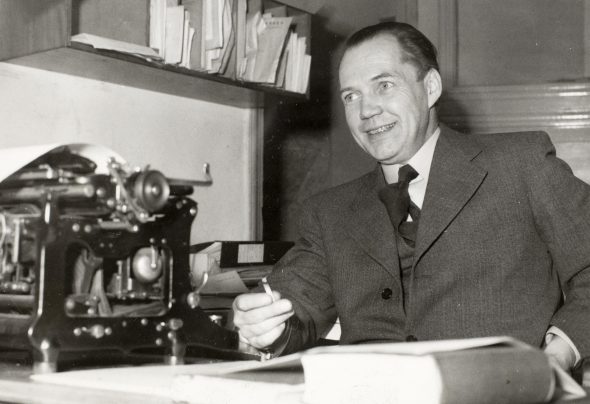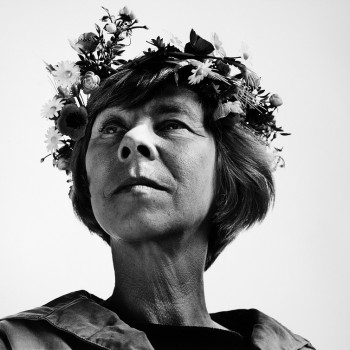Author: W. Glyn Jones
Ethics and the individual
Issue 1/1984 | Archives online, Authors, Interviews

Walentin Chorell. Photo: SLS
Over one hundred stage and radio plays, twenty six novels, poetry – the extent of Walentin Chorell’s work, from the early 1940s to his death last November was huge. The Finland-Swedish writer was by profession a teacher of psychology; his writing sprang from a real need to analyze the psychological drama of human life, to study other people – and at the same time himself – through the medium of literature.
His last television play, Hyena, is to be shown in Finland this summer, and his last radio play, Utopia, is to be broadcast in the spring. Many of his radio plays have been translated into the other Nordic languages, and his works have been performed and published in more than twenty countries.
The 71-year old writer was interviewed by Glyn Jones in Helsinki two months before his death.
‘I would say that writing for radio is what gives me most satisfaction, for there no limits are placed on your imagination. There are no limits in either time or space. On the radio you can have one scene portraying your main character as a child, and in the next as an adult; you can quickly follow that main character from childhood to adulthood, and your listeners will believe in it. As for space, you can set one scene in Paris – and indicate this by making a hotel porter call out the number of a room in French – and the following one can be set in Stockholm or Helsinki, and you can do it so convincingly that your listeners will believe in it.’ More…
The elusive reality of Ralf Nordgren
Issue 1/1982 | Archives online, Authors
The poet and novelist Ralf Nordgren, part Ålander by blood, has close family ties with some of the Åland Islands’ most most outstanding cultural figures. He is the nephew of Sally Salminen, and he was in fact born – in Vasa – in 1936, the very year in which she published her best-selling novel Katrina. His brother is the composer Pehr Henrik Nordgren, his mother, Aili Nordgren, is herself a writer who has published five novels based on life in Åland (see Books from Finland, 4/1977).
Nordgren’s father, who shares his wife’s left-wing views and was once a communist party official, is not a writer, but his formative role is quite apparent, clearly reflected in the figure of the father in the first of Ralf Nordgren’s novels, Med (‘Taken along’, 1968), in which there is an appreciable autobiographical element. On one level he is responsible for the political substratum of the family, on another for the regularity with which they move house in time with his changes of job. More…
Studies in obsession
Issue 2/1981 | Archives online, Authors

Tove Jansson. Photo: Hans Gedda
From Tove Jansson’s first short book, Småtrollen och den stora överstämningen (‘The little troll and the great flood’, 1945) to her latest volume of short stories, Dockskåpet (‘The doll’s house’, 1978 – see extracts 1 & 2), there is a great step, and few of the readers of that first children’s story could conceivably have foreseen just how far its writer was to go. Since her start in 1945 Tove Jansson’s reputation as the originator of the Moomintroll stories has become worldwide, and in one sense her own creation must have become a burden to her, not least because many of the themes which have emerged have been difficult to encompass within the Moomin framework. It is not easy for a writer who has created a reputation as a children’s author to break through what might be termed the ‘adult barrier’, but Tove Jansson has shown herself determined to do so, and with Dockskåpet she must surely have overcome any lingering doubts her readers may have had. Here is the adult writer, firmly in control of her art and delving into subjects far removed from the child mentality. More…
-
About the author
W. Glyn Jones (1928–2014) was a British scholar of language and literature specialising in Nordic literature. He was Professor of Scandinavian Studies at Newcastle and then at the University of East Anglia. Alongside his academic career he translated literary works from the Scandinavian languages, including Finland-Swedish, into English.
© Writers and translators. Anyone wishing to make use of material published on this website should apply to the Editors.
